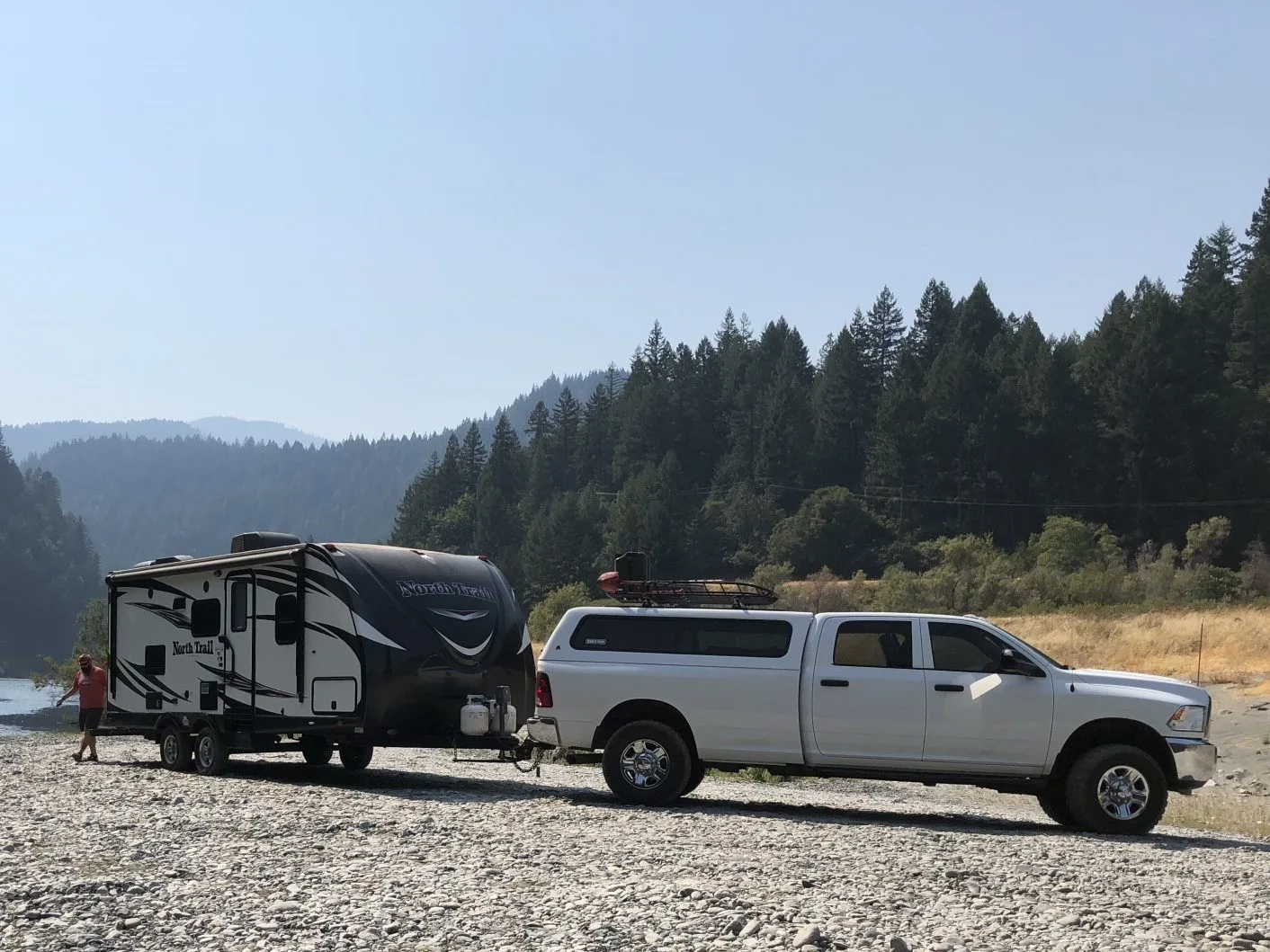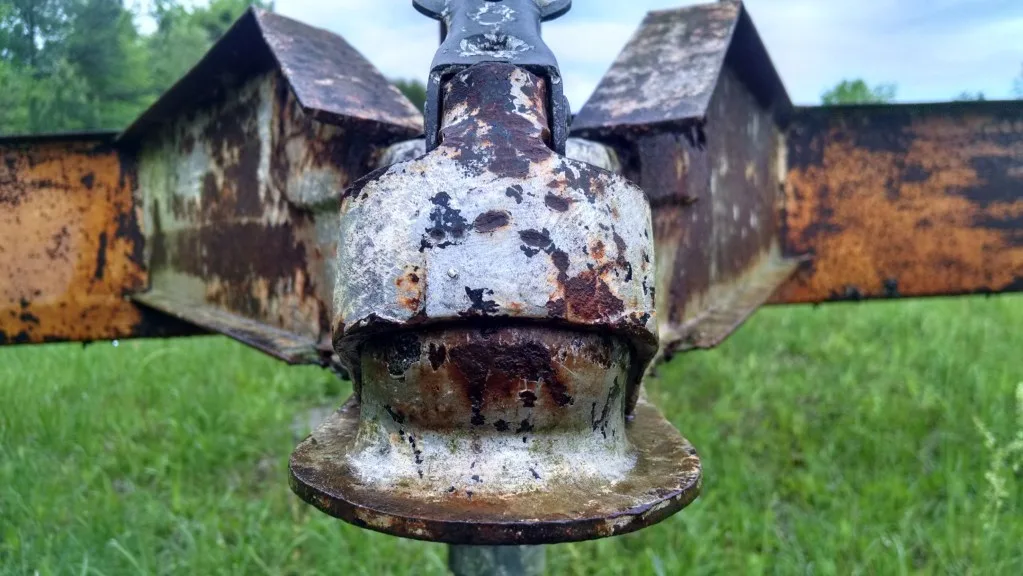To grease or not to grease your hitch ball? It’s an ongoing debate among RVers. The more RVers you ask, the more opinions you’ll get.
Below we’ll take a look at some of the benefits, disadvantages, and alternatives to greasing your trailer hitch ball.
Let’s dive in!
Does Your Hitch Ball Need to Be Greased?
If you want to maintain your hitch ball and prevent rust and corrosion, then yes, you should grease it. But you don’t have to do it. It’s totally up to you. Just be prepared to endure the loud squeakiness accompanying a rusty hitch if you don’t grease it.
The Benefits of Greasing
The biggest benefit of greasing your hitch ball is the protection. When you grease the hitch ball, you’re preventing the damage that comes from metal-to-metal contact. It’s going to get scratched up.
It’s going to peel. That’s just part of the trailer hitch connection. You’re also going to see gravel particles and dirt on the hitch, which will further damage it and cause scratches and dings.
Weathering and moisture cause the metal to rust and corrode. Grease helps prevent such damage so that your hitch ball lasts longer. Especially if your hitch ball is stationary for a while, grease will keep moisture from building up and causing rust.

The Disadvantages of Greasing
Some people do not like the “look” of a greasy trailer hitch ball. Maybe you just purchased a beautiful chrome hitch ball and don’t want to lather it in greasy goo the next day. But aside from the aesthetics, one disadvantage is that you can trap grime, sediment, bugs, and the like. These particles grind against the metal like sandpaper.
Another disadvantage is the mess. Grease sticks to everything, so if you have kids who run around your campsite, chances are one of them is going to run into the hitch ball and destroy a pair of pants.
Grease stains will cling tenaciously to clothing.
Is There an Alternative to Greasing Your Trailer Hitch?
If you don’t like the greasy “look” but want to protect your hitch ball, there are a couple of other things you can do to prevent rust and corrosion. First, cover the hitch ball when it’s not in use.
You’ll see buckets and plastic bags covering hitches on stationary RVs. This offers an added layer of protection from weathering. It also prevents people from accidentally running into the hitch and getting grease all over their pants.
Another alternative is using a dry lubricant that isn’t greasy at all.
You can pick up a Dry Graphite Lube from Amazon or a local retailer. T
his spray repels dirt while protecting the surface of the hitch ball from friction. However, because it’s in an aerosol can, it can still produce a mess. Ensure you’re performing your maintenance in a well-ventilated area and paying attention to where the spray goes. This lubricant also dries quickly and can withstand a tremendous amount of heat.
A similar alternative product is Tube-o-Lube. This is a dry powdered lubricant and not a spray but essentially has the same function. Both of these dry lubricants protect the hitch ball from dirt build-up and rust without the greasy mess.
Pro Tip: New to RVing and nervous to hitch up for the first time? We found 7 Tips for Hitching Up an RV Camper that Actually Work.

Can You Fix a Rusty Trailer Hitch Ball?
There are some do-it-yourself cleaning solutions out there. One suggestion is to use distilled vinegar or Coca-Cola to wipe off the rust. There are also rust removers you can buy. Some people will suggest using a wire brush when you see rust beginning to form. So yes, you don’t have to order a new trailer hitch ball at the first sign of rust.
But the biggest concern with rust is safety. Is the hitch ball structurally sound? For a while, this answer may be yes, and you can continue using it. But if you become concerned about the safety and performance of the trailer hitch ball, it’s time to get a new one.
Keep in Mind: Maintaining your RV is essential to extending its longevity. In addition to maintaining your hitch ball, here are some other areas to pay attention to that break first on your RV.

Should You Grease Your Hitch Ball When Towing a Camper?
This is the debate. Some seasoned RVers will adamantly tell you that greasing the hitch ball is an important part of your maintenance regimen. Others will list all of the disadvantages of greasing the hitch ball (trapping dirt and grime, dealing with the mess, etc.) and tell you it’s not necessary.
If you choose to grease your hitch ball, wipe it down before using the grease. Get all of the dirt, bugs, and moisture off of the hitch ball first, as well as any of the old grease. Also, choose a high-quality lubricant that won’t break down.
There isn’t one right answer to this question. However, almost all RVers and trailer hitch ball retailers will suggest that you need to do something to protect the hitch ball. Use grease. Use a dry lubricant. Get a cover. Whatever you choose to do, just do something so that moisture build-up doesn’t corrode the hitch ball. How do you take care of your trailer hitch ball?
Discover the Best Free Camping Across the USA
To be honest with you, we hate paying for camping. There are so many free campsites in America (with complete privacy).
You should give it a try!
As a matter of fact, these free campsites are yours. Every time you pay federal taxes, you’re contributing to these lands.
Become a FREE CAMPING INSIDER and join the 100,000 campers who love to score the best site!
We’ll send you the 50 Best Free Campsites in the USA (one per state). Access the list by submitting your email below:
i use Vasoline to lub the hitch ball & receiver, be careful (Wasps) like to build nest in the receiver..
You never mentioned using a Silicon spray. This is what my RV repair guy uses.
I remove the ball and ball mount from the receiver and carry them in my vehicle when not using them.
I regularly clean the hitch ball and the trailer socket, I re-grease them. When not in use I’ve taken a tennis ball and cut a slit in it to slip over the ball to protect it from getting dirt on it and keep grease from getting everywhere.
Get a quart of motor oil and apply it to any area that will have metal on metal contact, including weight distribution bars. I use a small amount on a rag or paper towel and lube as I’m hooking up the trailer. Once I get to a destination I can easily wipe off any oil if needed to protect us from getting it on our clothes. Grease will hold dirt, gravel, or any other foreign debris and can cause damage as noted in this article.
Yep, I grease it with a little white lithium. Keeps it quiet and helps the ball slide into the coupler more easily. I clean it off sometimes using a little water and a few paper towels. But, I don’t actually care what my hitch ball looks like. I don’t even wash my truck.
You don’t grease the ball for the sake of the ball you grease it for the hitch. The hitch is just stamped steel most of time and a lot thinner than the ball. The grease will slow down the wear and tear on the hitch
I ruined a brand new 2 5/16 ball putting grease on it, 3000 miles it picked up dirt, grit ,dust, anything else that would stick to it, you wouldn’t believe how it sqweald with all the crap in it!
Wax paper on the ball works best. 4 inch square does it
This is easy. Always grease your hitch ball
Carry a roll of paper towels. Once you are unhitched, it takes 2 seconds to wipe the grease off of the ball.
Add a little grease before re-hitching. No need for debate.
I am a fervent proponent of GREASE. To prevent the “mess” you can either purchase a ball cover or make one with a old tennis ball. Another way is to take a rag and simply wipe it off. Here’s why – case study if you will. Used to have a somewhat large pull trailer with equalizer bars. I wanted to keep everything “clean” sans grease. The thing screamed (noise) at the ball coupler and both equalizer connections. I went to inspect and all connections still picked up debris. Scratched all surfaces with some pretty nasty gouges. Cleaned everything up and then added grease, smooth as silk the way it was “designed”. Adding unneeded friction to a hinged connection is not good, heat, additional wear and binding can easily be avoided. My “tow” cents maybe not worth a nickel.
I use a latex glove, dip into bearing grease, grab hitch ball and slide glove off your hand onto the hitch.
Looking for free camping places around seat texas
Yes, I grease the ball on my hitch and I have a hitch ball cover. No problems and wouldn’t have it any other way!!!
The most important reason to grease both your hitch and your hitch ball is so that they will effortlessly release upon uncoupling. Ever jumped up and down on your back bumper to disconnect? GREASE YOUR BALL!!!